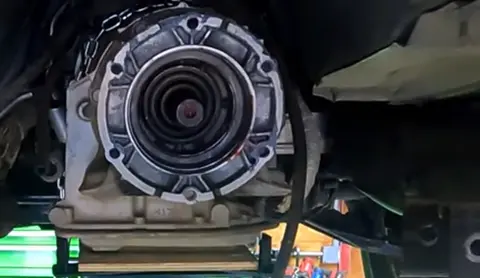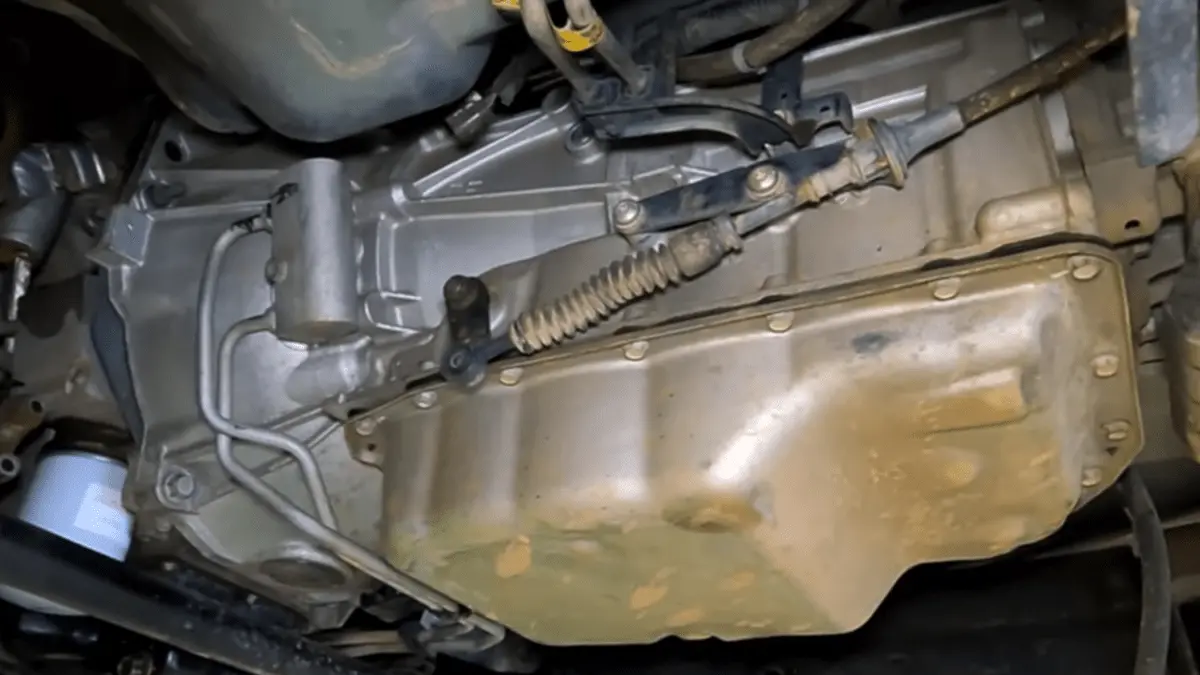The 2014 GMC Sierra, a robust and reliable vehicle, may encounter transmission issues that demand careful attention and swift resolution. As the lifeline connecting the engine’s power to the wheels, the transmission plays a pivotal role in the Sierra’s performance.
This blog post delves into the common transmission problems experienced by the 2014 GMC Sierra, shedding light on the causes, symptoms, and potential solutions. Join us on a comprehensive exploration of the transmission quandaries plaguing the 2014 GMC Sierra.
Common Reasons for 2014 GMC Sierra Transmission Problems

The 2014 GMC Sierra, renowned for its durability and performance, may encounter transmission issues that warrant attention. Understanding the underlying causes of these problems is crucial for prompt diagnosis and effective resolution. Here are common reasons for transmission issues in the 2014 GMC Sierra:
1. Worn-Out Transmission Fluid:
Cause: The passage of time takes a toll on the transmission fluid in the 2014 GMC Sierra, causing it to degrade and lose its essential lubricating and cooling properties. As the fluid ages, it becomes less effective in reducing friction, a critical function for smooth transmission operation. This diminished lubrication can lead to overheating, posing a significant risk to the integrity of transmission components.
Impact: The repercussions of worn-out fluid manifest in various ways, including delayed shifts that disrupt the seamless transition between gears. Additionally, shuddering becomes a prevalent issue, affecting the overall driving experience. The compromised lubrication also accelerates wear on crucial transmission parts, emphasizing the importance of timely fluid replacement for sustained performance.
2. Torque Converter Wear:
Cause: The torque converter, serving as a crucial link between the engine and the transmission in the 2014 GMC Sierra, is susceptible to wear and tear over time. Continuous usage contributes to the gradual degradation of this vital component. As wear sets in, the torque converter may exhibit symptoms like shuddering, overheating, and challenges in maintaining a consistent speed.
Impact: The consequences of a worn-out torque converter extend to the overall functionality of the transmission. Its compromised state jeopardizes the smooth operation of the transmission, introducing disruptions that can significantly impact the vehicle’s performance. Addressing torque converter wear promptly is essential to maintain the integrity of the transmission system and ensure a reliable driving experience.
3. Unusual Noises:
Cause: Unfamiliar sounds—whining, grinding, or clunking—emanating from the 2014 GMC Sierra’s transmission may point to issues related to contaminated or degraded transmission fluid. These noises often serve as indicators of potential internal damage or increased friction within the transmission.
Impact: Disregarding abnormal noises poses a considerable risk, potentially leading to exacerbated damage and elevated repair costs. Timely intervention is paramount to prevent the escalation of transmission issues. Addressing the root cause, such as contaminated fluid or internal damage, is crucial for preserving the longevity and functionality of the transmission system.
RELATED: GMC Sierra Ticking Noise When Accelerating
4. Delayed Shifts:
Cause: The emergence of delayed shifts in the 2014 GMC Sierra, characterized by a prolonged transmission time to change gears, can be attributed to multifaceted factors. Issues with the transmission control module, malfunctioning solenoids, or degraded fluid are potential culprits contributing to this concern.
Impact: The repercussions of delayed shifts extend beyond mere inconvenience. Performance troubles ensue, with the vehicle experiencing compromised acceleration and responsiveness. Reduced fuel efficiency becomes a tangible consequence, affecting overall mileage. Prolonged occurrences of delayed shifts may lead to potential long-term damage to critical transmission components, emphasizing the importance of timely diagnosis and intervention.
5. Hard Shifts and Jerking:
Cause: The occurrence of hard shifts and jerking motions during gear changes often signifies underlying issues. Problems with the transmission fluid, faulty solenoids, or complications within the valve body can contribute to these disruptive gear transitions.
Impact: Persistent hard shifts introduce heightened wear on transmission bands and clutches, diminishing the overall smoothness of gear changes. This not only compromises the driving experience but also poses a risk to the longevity of essential transmission components. Timely identification and resolution of the root causes are imperative for preserving transmission functionality.
6. Gear Sticking:
Cause: Gears becoming stuck in the 2014 GMC Sierra may result from linkage problems, damaged synchros, or internal damage within the transmission. Misalignments or obstructions in the linkage impede the seamless engagement of gears.
Impact: Gear sticking presents a direct challenge to drivability, causing difficulty in shifting gears and potentially leading to erratic driving experiences. Furthermore, prolonged instances of gear sticking can contribute to damage within the transmission, underscoring the significance of prompt investigation and remediation to ensure optimal transmission performance.
7. Transmission Leaks:
Cause: The occurrence of transmission fluid leaks in the 2014 GMC Sierra is often traced back to damaged seals, gaskets, or loose connections within the transmission system. Ignoring these leaks can have detrimental effects, compromising the integrity of the transmission.
Impact: The ramifications of transmission leaks are profound, primarily manifesting in low fluid levels. This, in turn, can lead to overheating, a critical issue that accelerates premature wear on vital transmission components. Identifying and promptly addressing leaks is crucial to maintaining optimal fluid levels and preventing extensive damage that can jeopardize the overall functionality of the transmission.
8. Lack of Regular Maintenance:
Cause: Neglecting regular maintenance practices, including timely transmission fluid changes, contributes to a spectrum of potential issues in the 2014 GMC Sierra. The absence of preventive care can lead to the degradation of fluid quality, heightened friction, and an increased susceptibility to wear on transmission components.
Impact: Regular maintenance emerges as the cornerstone for prolonging the lifespan of the transmission. Neglecting this essential aspect introduces avoidable transmission problems, ranging from delayed shifts to increased repair costs. Prioritizing routine maintenance ensures the transmission operates optimally, enhancing overall vehicle performance and reliability.
How do you fix the 2014 GMC Sierra transmission problems?
Addressing transmission problems in the 2014 GMC Sierra requires a systematic approach to diagnosis and repair. While some issues may necessitate professional assistance, there are several steps owners can take to mitigate common transmission issues.
1. Transmission Fluid Replacement:
Regular transmission fluid changes are crucial for optimal performance. If the fluid is degraded or contaminated, a complete flush and replacement with the manufacturer-recommended fluid can alleviate issues such as delayed shifts and shuddering. Following the recommended maintenance schedule is essential to prevent premature wear on transmission components.
2. Torque Converter Inspection and Replacement:
If the torque converter is identified as the source of problems, professional inspection and potential replacement are recommended. A worn-out torque converter can lead to various issues, and addressing it promptly can restore smooth transmission operation.
3. Identify and Resolve Unusual Noises:
Unusual noises, such as whining or grinding, may indicate internal transmission damage. If these sounds persist, seeking a professional diagnosis is essential. Ignoring abnormal noises can lead to further damage and increased repair costs.
4. Address Delayed Shifts:
For delayed shifts, inspecting the transmission control module, solenoids, and fluid quality is crucial. Depending on the diagnosis, reprogramming the transmission control module or replacing faulty solenoids may be necessary to restore proper shifting.
5. Resolve Hard Shifts and Jerking:
Hard shifts and jerking motions during gear changes may be mitigated by addressing issues with the transmission fluid. A complete fluid change, along with inspecting and replacing faulty solenoids or addressing valve body issues, can contribute to smoother gear transitions.
6. Investigate Gear Sticking:
Gear sticking may require a comprehensive investigation into linkage problems, damaged synchros, or internal transmission damage. Clearing any obstructions in the linkage and addressing internal issues can restore proper gear engagement.
7. Repair Transmission Leaks:
Identifying and fixing transmission fluid leaks is crucial to preventing low fluid levels and subsequent overheating. This involves inspecting and replacing damaged seals and gaskets or tightening loose connections. Prompt action is necessary to maintain proper transmission function.
8. Prioritize Regular Maintenance:
Neglecting regular maintenance is a common cause of transmission problems. Adhering to the manufacturer’s recommended maintenance schedule, including timely fluid changes and inspections, is essential for preventing avoidable issues and ensuring the longevity of the transmission.
FAQs
1. What are the signs of torque converter wear in the 2014 GMC Sierra?
Signs of torque converter wear include shuddering, overheating, and difficulties in maintaining a steady speed. Addressing these symptoms promptly is crucial to maintain optimal transmission performance.
2. Can transmission fluid leak lead to severe damage?
Yes, ignoring transmission fluid leaks can result in low fluid levels, leading to overheating and premature wear on transmission components. Identifying and fixing leaks promptly is vital for proper transmission function.
3. How can owners address delayed shifts in their GMC Sierra?
Owners can inspect the transmission control module, solenoids, and fluid quality. Reprogramming the module or replacing faulty solenoids may be necessary to restore proper shifting.
4. What steps can be taken to prevent transmission problems in the GMC Sierra?
Regular maintenance, including timely fluid changes and inspections, is crucial for preventing avoidable transmission issues. Adhering to the manufacturer’s recommendations is key for longevity.
5. Is unusual noise always a sign of internal transmission damage?
Unusual noises like whining or grinding may indicate internal damage or degraded fluid. Ignoring these sounds can lead to increased damage and repair costs. Seeking a professional diagnosis is recommended.
Final Words
Navigating 2014 GMC Sierra transmission problems requires a proactive approach. Understanding the signs, causes, and potential solutions empowers owners to address issues promptly and preserve the longevity of their vehicles. Whether it’s regular maintenance, fluid changes, or seeking professional assistance for complex problems, taking these steps ensures a smoother driving experience for GMC Sierra enthusiasts. Stay informed, stay vigilant, and keep your Sierra’s transmission running smoothly on the road ahead.

Eric L. Friedman is a car expert who has worked on Chevy and GMC trucks for over 10 years. He started AutoYolo to help people fix their own cars. On the blog, he shares easy tips, step-by-step guides, and repair advice to make car problems less stressful and more affordable.

